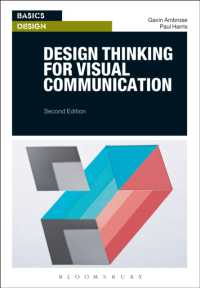- ホーム
- > 洋書
- > 英文書
- > Psychology
Full Description
"This is essential reading for parents." — Dr. Vivek Murthy, former U.S. Surgeon General
Greatly expanding his award-winning New York Times series on the contemporary teen mental-health crisis, Pulitzer Prize-winning science reporter Matt Richtel delivers a groundbreaking investigation into the psychology of adolescence, the pivotal life stage undergoing profound—and often confounding—transformation.
One of The New Yorker's Best Books of 2025
The transition from childhood to adulthood is a natural, evolution-honed cycle that now faces radical change and challenge. The adolescent brain, sculpted for this transition over eons of evolution, confronts a modern world that creates so much social pressure as to regularly exceed the capacities of the evolving mind. The problem comes as a bombardment of screen-based information pelts the brain just as adolescence is undergoing a second key change: puberty is hitting earlier. The result is a neurological mismatch between an ultra-potent environment and a still-maturing brain that can lead to anxiety and depression in teens and other mental health challenges. It is a crisis that is part of modern life but can only be truly grasped through the broad, grounded lens of the science of adolescence itself. Through this lens, Richtel shows us how adolescents can understand themselves, and parents and educators can better help.
For decades, this transition to adulthood has been defined by hormonal shifts that trigger the onset of puberty. But Richtel takes us where science now understands so much of the action is: the fascinating topic of adolescent brain development. A growing body of research that looks for the first time into budding adult neurobiology explains with untold clarity the emergence of the "social brain," a craving for peer connection, and how the behaviors that follow pave the way for economic and social survival. This period necessarily involves testing—as the adolescent brain is programmed from birth to take risks and explore themselves and their environment—so that they may be able to thrive as they leave the insulated care of childhood.
Richtel, diving deeply into new research and gripping personal stories, offers accessible, scientifically grounded answers to the most pressing questions about generational change. What explains adolescent behaviors, risk-taking, reward-seeking, and the ongoing mental health crisis? How does adolescence shape the future of the species? What is the nature of adolescence itself?
The Teen Mental Health Crisis: Explore the neurological mismatch between a still-maturing brain and a high-pressure modern world that is contributing to soaring rates of anxiety and depression.
Neurobiology of Puberty: Go beyond hormones to understand the science of the developing "social brain," the craving for peer connection, and the evolutionary drive for risk-taking.
A Guide for Parenting Teenagers: Gain a scientifically grounded lens to understand the adolescent in your life, offering accessible answers and effective ways to help them navigate this pivotal stage.
Compelling Narrative Nonfiction: Journey through the latest research, brought to life by the gripping personal stories of adolescents grappling with the challenges of growing up today.








